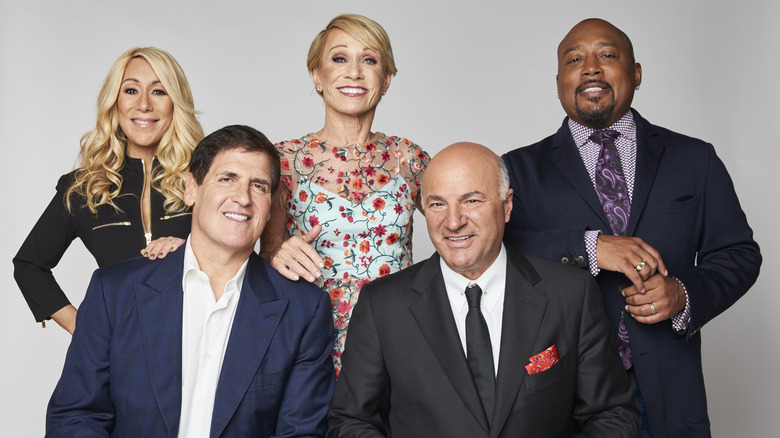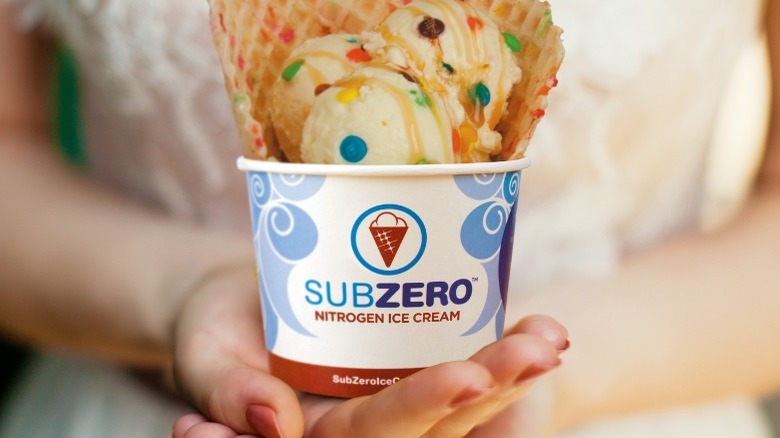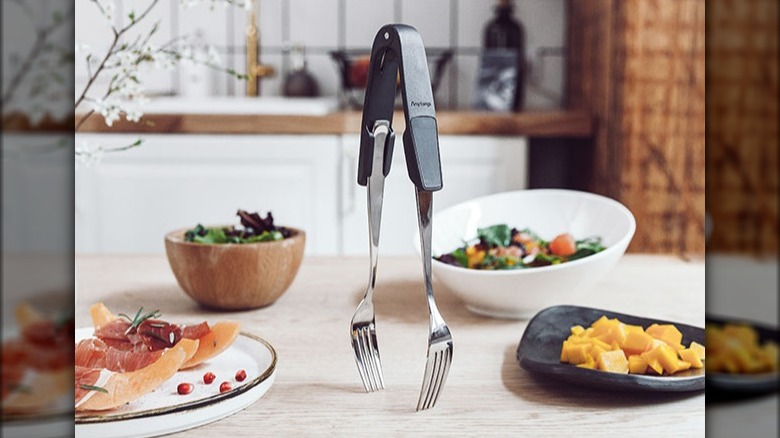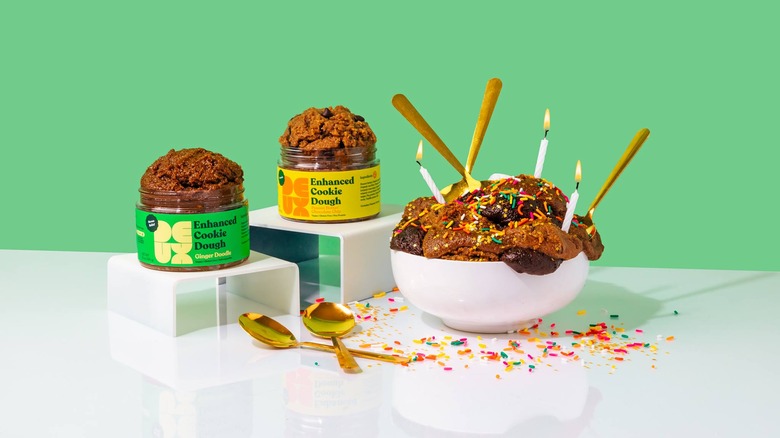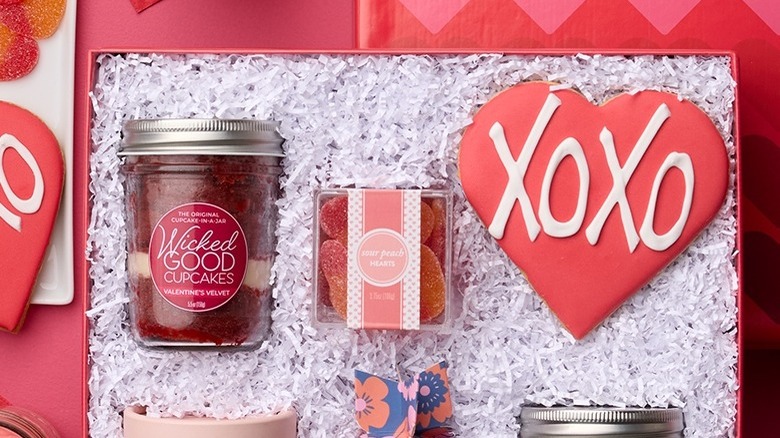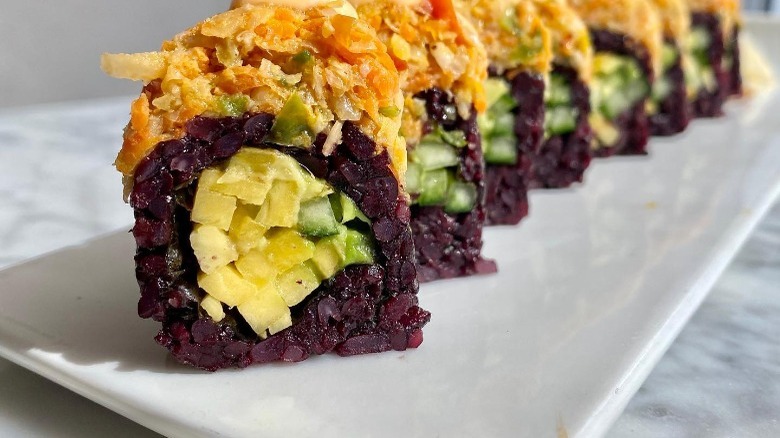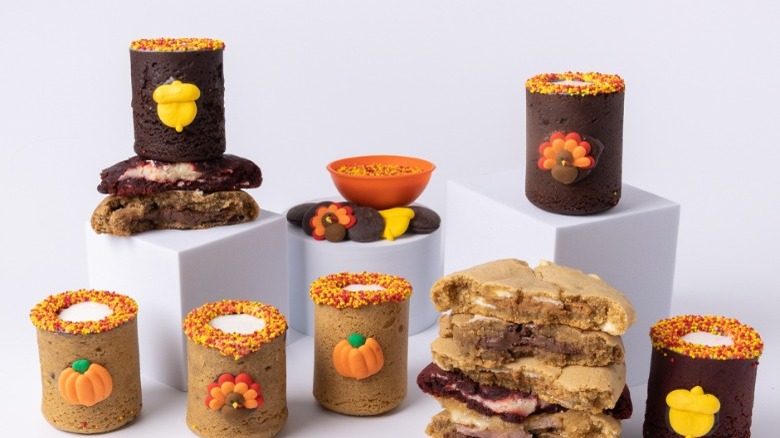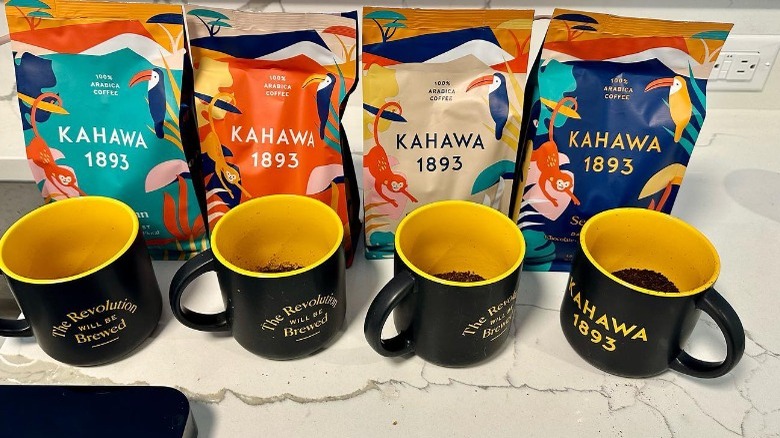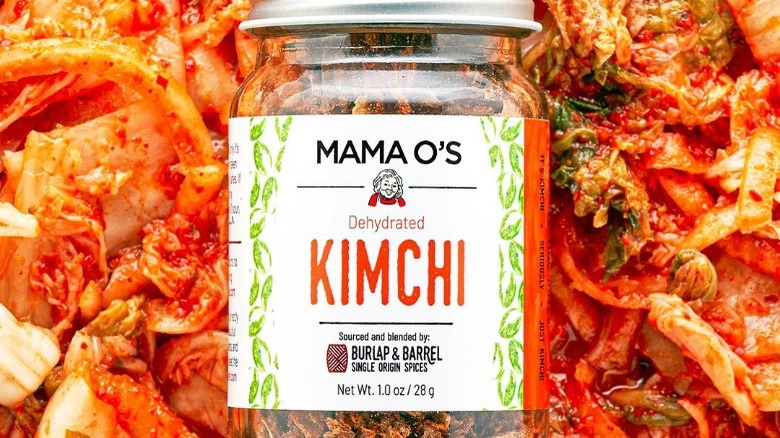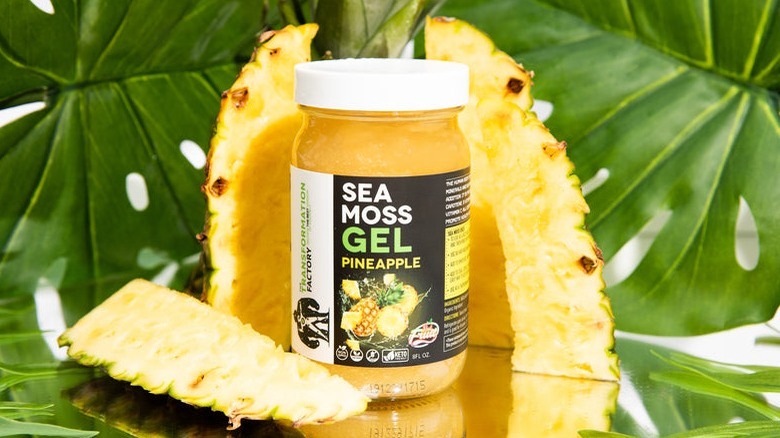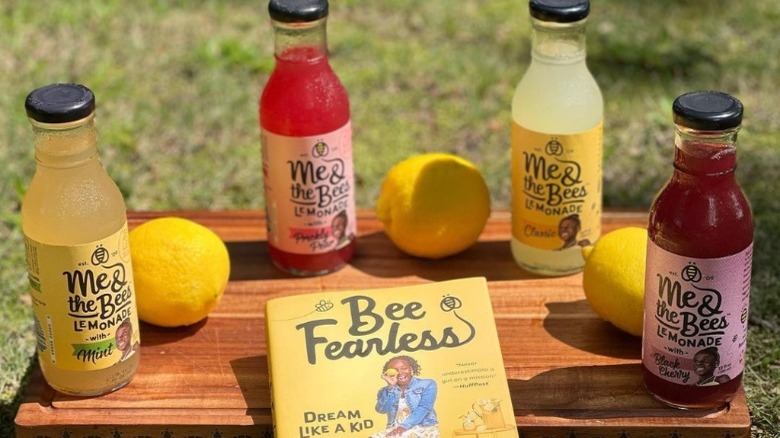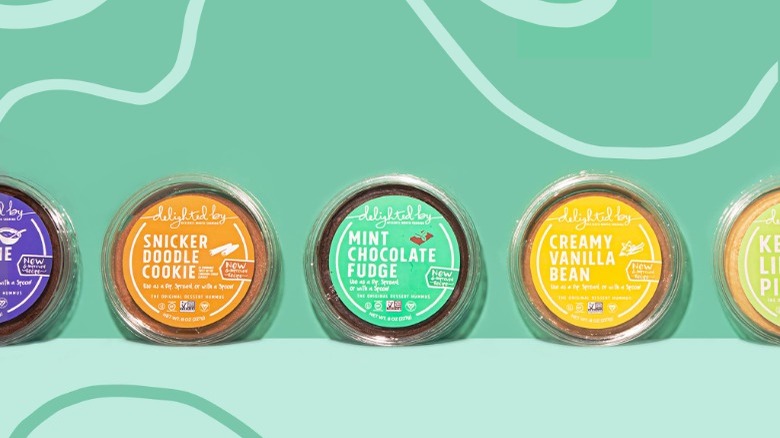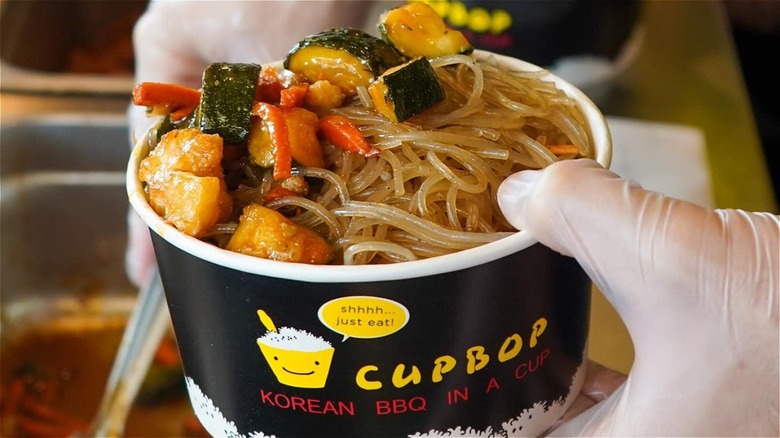What The Most Memorable Shark Tank Food Companies Are Doing Now
"Shark Tank" has turned the art of the sale into a form of entertainment everyone in your family can enjoy. Landing a spot on "Shark Tank" offers emerging entrepreneurs more than publicity for their growing business during a prime-time television show. In fact, this one of a kind reality show, available for streaming on Hulu, gives budding entrepreneurs the opportunity to deliver their pitch to high-profile business people in the hopes of convincing them to invest in their startups.
This life-changing opportunity attracts a wide range of folks, from different cultures and walks of life, with products as varied as the entrepreneurs who sell them. After all, food has a special way of bringing people together. From delicious snacks and healthy treats (some of which seem to have come straight out of a sci-fi film), these memorable "Shark Tank" food companies have something remarkable to offer everyone. Let's take a look at some of the most memorable food companies that appeared on "Shark Tank" and see what they are up to now.
Sub Zero Ice Cream
If you ever thought a bowl of ice cream is merely an indulgent treat, think again! Jerry and Naomi Hancock are the couple behind Sub Zero Ice Cream, a company that uses liquid nitrogen to freeze custom ice cream flavors before the customer. Not only is this a sight to behold, the liquid nitrogen ice cream sensation is also full of educational opportunities.
Jerry used his chemistry degree from Brigham University to develop a technique that harnesses the freezing temperature of liquid nitrogen (a potentially hazardous substance) to make ice cream, according to Shark Tank Products. This method is safe for employees and customers alike. One of the highlights is that it gives the customer the freedom to customize their ice cream, including the flavor, mixings, and toppings.
Seeing the team prepare the samples for the investors on "Shark Tank" was like a trip to a science fair, with rolling clouds of fog accompanying the refreshing dessert. With clouds of liquid nitrogen, the team elevated this common snack into a futuristic experience — and secured a patent so their idea cannot legally be replicated by any other business.
While the Hancocks did not secure an investment from the sharks, their business has continued to grow. The publicity from appearing on "Shark Tank" has helped increased their business by as much as three times for many of the Sub Zero franchises, with new locations appearing nationally and in other countries as well.
Anytongs
Have you ever fumbled around the kitchen looking for the perfect pair of tongs? Well, Anytongs transforms any pair of eating utensils into a pair of tongs. This innovative product allows customers to avoid filling their kitchen drawers with multiple tongs in the hopes of having the perfect size for every occasion.
Anytongs founder Tog Samphel openly decried the vices of "grind culture" to the business tycoons. While this was a bold statement, Samphel had many valid concerns. He refused to give up quality time with his family, work himself to exhaustion, or gamble with his family's financial security by giving up his job to work on his startup full-time.
Prior to appearing on "Shark Tank," Samphel's business was growing slowly. Samphel's Kickstarter more than tripled the amount he had hoped to raise. Despite that success, he had only earned $7K in sales due to challenges from the global Covid-19 pandemic.
Ultimately, Daymond John made a deal with Samphel for 49% of the company in exchange for an investment of $150K. Now, Anytongs seems to be doing well. At the time of this writing, customers can buy a single unit for $12.99 and a package of two for $19.99. Their website reports that customers can anticipate adding three to five business days to order fulfillment.
Deux
Have you ever debated indulging in a decadent dessert or choosing a healthy alternative? Well, now you can kiss that problem goodbye. Enter Deux, a snack that tastes great, and is good for you too! Every batch of cookie dough made by founder Sabeena is vegan, plant-based, gluten-free, and jam-packed with nutrients that are beneficial to your health.
Deux founder, Sabeena Ladha conceived the idea for the delicious baked goods and launched her company during the pandemic. She consulted with a naturopathic doctor while researching ingredients to enhance both the flavor profile and health benefits of the cookie dough.
Unfortunately, Sabeena left the "Shark Tank" without a single deal, after trying unsuccessfully to negotiate the only offer she received from Robert Herjavec. Since appearing on the show, Ladha continues to sell her Deux on her company website and delivers the cookie dough nationwide. Deux is the most popular cookie dough brand in Erewhon stores in LA.
Wicked Good Cupcakes
This mother-daughter team founded a business that delivers cupcakes nationwide. When word spread about the small company Wicked Good Cupcakes, it proved quite challenging to ship their cupcakes in such a way that they arrived at their destination intact. So they came up with the unique idea to ship their cupcakes in Mason jars, ensuring freshness and preserving the presentation.
Sales skyrocketed after the coincidental advertising provided when the TSA confiscated someone's Wicked Good Cupcake on an airline – all because it exceeded the three ounce limit on liquids.
The dynamic duo are quite successful now, baking 1 million cupcakes and shipping about 500,000 mason jars per year. They were able to pay back Kevin's investment of $75,000 in about six weeks. Wicked Good Cupcakes offers digital gift cards, party packs, birthday cake and sparkling wine packages, offers customized labels for weddings & events, and has even launched a food truck franchise.
Beyond Sushi
For all the vegans out there who would like to enjoy sushi but can't typically indulge in this iconic Japanese dish, Beyond Sushi has a menu full of options. On Yelp, business owner Guy Vaknin shared that "Our 100% vegan & kosher menu is carefully crafted to support the earth and the environment." The company prioritizes sustainability, creativity, and elevating an entirely vegan menu for an enjoyable, healthy, and inspiring meal made with fresh, seasonal ingredients.
However, there has been some controversy that the offerings can't truly be considered sushi. One of the few one star reviews on Yelp opened, "This is Not Sushi" and continued in the accompanying photo comment, "If you DON'T have FISH, it's NOT SUSHI!!! Sorry veggie heads. But No!"
Some folks may wonder where this restaurant falls in the distinction between cultural appropriation and cultural appreciation, since the owner's cultural background doesn't herald sushi as part of their cultural traditions. This delicate topic didn't stop Beyond Sushi from being successful on their "Shark Tank" debut and onward.
According to Shark Tank Recap, Vaknin landed a deal for $1.5 million with Lori Greiner and guest shark Matt Higgins in exchange for 30% equity on the West Coast Location + 15% equity on the East Coast. They currently have three restaurants around NYC and offer a range of catering options.
The Dirty Cookie
The Dirty Cookie, founded by Shahira Marei, makes shot glass-shaped cookies that you can fill with milk, ice cream, or even sweet liquor. When Marei was young, she was devastated by the poverty she witnessed on a trip home to Egypt. Her father convinced her that offering people a job was the best thing she could do for them. So she decided to build her own company.
Part of the proceeds from every item is donated to one of Dirty Cookie's partner organizations, which provide educational opportunities to young people in under-resourced communities through her ShotForEducation initiative. The company has supported such organizations as Girls Who Code as well as TNTP: Reimagine Teaching. In 2021, the company opened their first international franchise in Egypt.
Marei made a deal with Robert on "Shark Tank." Robert offered $500,000 for 30% equity under the condition that his share would lower to 15% if the Dirty Cookie reached their goal of $6 million in 2023. When Marei countered for an initial equity of 25%, they struck a deal.
In addition to vegan and gluten-free cookie shot options, Dirty Cookie now offers cookies stuffed with various fillings such as PB&J, chocolate chip with Nutella, and apple pie. The company offers merch and custom edible gifts with the option to customize them with corporate branding. Dirty Cookie also has wholesale purchase offers and special pricing for orders made in bulk.
Kahawa
Kahawa 1893 is a coffee company that aims to address issues of gender equity in the coffee industry. Owned by Margaret Nyamumbo, a Black woman from Kenya, Kahawa 1893 focuses on supporting female farmers who typically "provide 90% of labor but own 1% of land" according to the Kahawa 1893 website. In order to help reverse this inequity, Nyamumbo only purchases coffee from women farmers in Kenya and Rwanda who receive fair wages. By allowing customers to send a tip to the farmers and backing every dollar with a match program, Kahawa 1893's business model proves their commitment to supporting their female coffee farmers.
The high altitude on Mount Kenya where coffee grows in rich volcanic soil means that the Kenyan terroir boasts the perfect conditions to produce some of the most renowned coffee in the world. No wonder Kahawa 1893 has such high demand that some products ship in one to two weeks. According to Shark Tank Recap, after striking a deal with guest investor Emma Grede for $350,000 for 8% equity, Nyamumbo is on track to make an estimated $4 million in sales by the end of 2023. The company has a mission to tackle gender equity in the coffee industry, and many deliciously complex flavors to choose from.
Mama O's Kimchi
Kheedim Oh founded Mama O's Kimchi by accident, while in search of homemade kimchi for himself. His parents lived too far away for him to spontaneously stop by for a jar. He made several trips from Chinatown in New York City to D.C. (where his parents lived) so his mom could teach him how to make kimchi.
While it started as sharing kimchi with friends and family, demand soon required him to make bigger and bigger batches. His business grew so much that he began providing authentic, homemade kimchi for bodegas, grocery stores, and restaurants – across the U.S. and internationally.
While the mother and son team didn't land a deal on "Shark Tank," the publicity from the show certainly didn't hurt. According to Kimchi Rules, the current offerings include several different varieties of kimchi (including a vegan option), a line of kimchi paste, kimchi-making kits, and more. With an active social media presence, and several products selling out, business is booming for Mama O's Kimchi.
The Transformation Factory
Alexiou Gibson founded the Transformation Factory in order to share the many health and medicinal benefits of sea moss. Gibson, who is from the Bahamas, suffered from a variety of chronic health issues for several years and was told that his health was beyond repair and that his years were limited. Instead of accepting the doctor's prediction, he changed his lifestyle by exercising and going vegan.
It was important for Gibson to share with others the transformational answers he found while he was searching for a way to improve his health. Enter the Transformation Factory, a company that compiles the information and products that he used to change his life so that others can do the same.
According to the Transformation Factory, the sea moss they offer is wildcrafted, or harvested naturally without harmful pollutants or pesticides. It contains 92 of the 102 nutrients the human body needs, filling in the gaps busy lifestyles leave in our nutrition.
On "Shark Tank," Gibson landed a deal with comedian Kevin Hart and Mark Cuban, who jointly invested $600,000 in exchange for 20% equity. Gibson's business is currently experiencing production delays of as much as eight weeks from purchase to receipt of these sea moss blends. That said, they offer sea moss in a variety of forms, from a 30-day supply of sea moss capsules to flavored sea moss gels.
Me and the Bees Lemonade
When Mikaila Ulmer was four and half years old, she was stung by two bees in one week. Despite the painful experience, she became fascinated by the major role bees play in supporting various ecosystems. Around the same time, she signed up to participate in a children's business competition.
Drawing inspiration from her great-grandmother's favorite lemonade recipe and her experiences learning about bees, she decided to make lemonade her signature product. Not only does the sweet beverage highlight the need to protect the declining bee populations, the flax seeds in every drink also provide great health benefits.
After five and a half years of business, Mikaila and her dad Theo appeared on "Shark Tank" in pursuit of a deal to help launch Bee Sweet Lemonade (which was the name at the time) to new heights. When Daymond John delivered the only offer they received for $60,000 in exchange for 25% equity in their company, the father-daughter team accepted. Since then, the family business has changed their name to "Me and the Bees Lemonade." The product is available in Whole Foods, Kroger, and an ever increasing number of retailers, delivery companies, and restaurants.
Every bottle of lemonade purchased from "Me and the Bees Lemonade" supports The Healthy Hive Foundation, a nonprofit that supports research, education and social entrepreneurship to protect the bees. Now that's a sweet deal.
Delighted by Hummus
You may be familiar with hummus, a dish with a controversial origin story made from a base of chickpeas, tahini, lemon, and olive oil. But have you heard of the new dessert hummus? Delighted by Hummus makes the same chickpea base with a twist: a slew of new sweet flavors such as vanilla bean, snickerdoodle, and brownie batter.
The business was already successful by the time the founder appeared on "Shark Tank," with $1 million in sales in the first year, and it appeared in over 1,000 stores. Their innovation stirred up controversy around whether the dip should be called a form of hummus since it's different from the original dish that holds so much cultural significance for many people.
Founder Makenzie Marzluff earned a deal with Mark Cuban, but it never panned out. Since appearing on "Shark Tank," Delighted By has gone out of business, having been pushed out of the market by big name brands in the field that co-opted her idea. According to Shark Tank Recap, Marzluff has since published a book, "How to Lead a Badass Business from Your Heart."
Cupbop, Korean BBQ in a Cup
Originally from South Korea, founder Junghun Song wanted to share his love for Korean food and culture with the world. He and two of his buddies started a food truck to share their culture with folks on the go, and created Cupbop, Korean BBQ in a cup.
When Song appeared on "Shark Tank" with Dok Kwon, they had great energy. Kevin O'Leary even complimented this dynamic duo, saying that Cupbop offered the best food he had tasted on "Shark Tank" to date. The financial success they brought to the table was so remarkable that they had all of the Sharks vying for the opportunity to strike a deal with them.
While they got several offers, Song and Kwon ultimately accepted a deal from Mark Cuban: $1 million for 5% equity. Since their appearance on "Shark Tank," Cupbop has grown significantly with nine more stores in the U.S. as well as over 100 in Indonesia. They also offer catering services as well as the opportunity for others to partner with them as franchise owners. Not only were Junghun Song and Dok Kwon able to share their culture and the appeal of Korean food with the world, they seemed to genuinely have a lot of fun along the way.
